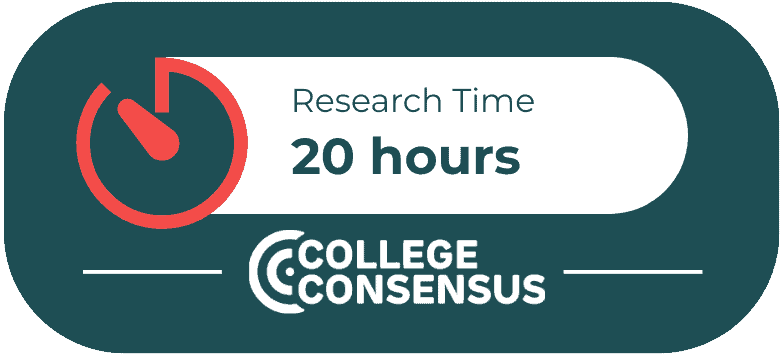
If you love young children, you may enjoy the idea of teaching them necessary life lessons. In this case, you may consider a job as a preschool teacher. This career path requires a number of skills and education. So what degree do you need to teach preschool?
Recommended Online Degree Programs
Explore our featured online programs to find the right match for you today.
What Skills Are Necessary for a Preschool Teacher?
Guiding the minds of America’s youth is a rewarding career. There are particular skills that will make you successful in this profession.
- Patience. Young children do not often have discipline to sit still and to follow directions. Many times, students may be dealing with family difficulties that bleed into the classroom as well. No matter, it is essential for a preschool teacher to remain calm and to practice patience. This conveys a sense of safety and security to all students.
- Creativity. When dealing with exceptionally young children, it is essential for a teacher to create activities that are fun and educational. This grade level is a time for kids to discover the world. This occurs through play and other interactive lessons. To be effective, you must think out-of-the-box and engage your students.
- Communication. All children are different. For the most part, preschool is the first formal classroom learning that occurs. Therefore, a preschool teacher must use different communication methods, because kids have many learning styles. If you are a preschool teacher, you have to communicate well with parents as well.
Do You Need a College Degree to Be a Preschool Teacher?
To become a preschool teacher, the lowest level of education that you need is a high school diploma. In an associate program, you will concentrate your studies on psychology or childhood education.
Most states have regulations in place that require preschool teachers to receive training before he or she is hired. For example, you may work as a teacher’s aid or a daycare worker. This provides invaluable knowledge about effectively shaping young minds.
| Education Level (Preschool Teacher) | Salary Range |
|---|---|
| No Diploma | $36,089 – $38,351 |
| High School Diploma or Technical Certificate | $36,541 – $38,747 |
| Associate’s Degree | $37,050 – $39,197 |
| Bachelor’s Degree | $37,503 – $39,863 |
| Master’s Degree | $37,786 – $40,279 |
Ready to start your journey?
Do You Need Any Certifications?
Certain states require certification for preschool teachers. For example, the Council for Professional Recognition Child Development Associate Certificate is granted to teachers who complete classroom training and observation. Also, you must pass an examination and must renew it every three years.
You may receive a National Early Childhood Program Accreditation Child Care Professional Certificate after completing a two-year course. Usually, this is a smart path for a person with no college degree. To earn this certification, you must pass a test.
How Long Does Preschool Teacher Training Take?
The training time to become a preschool teacher varies and depends on your certificate or degree for preschool teacher.
The U.S. Bureau of Labor Statistics states that some preschools might only ask for a high school diploma and a special certificate called a Child Development Associate Credential. Getting that certificate could take two years or even less. But other preschools might want you to have a bachelor’s degree, which takes four years of college.
There’s a reason for that! A bachelor’s degree in early childhood education teaches you a lot more than just how to take care of young kids. It dives deep into how their minds grow and develop, how to create the best learning environment for them, and even how to deal with tricky situations that might come up in the classroom. So, with a bachelor’s degree, you’ve got all the skills and knowledge to help your students learn and have fun in the best way possible!
| Education Level | Percentage of Pre-K Teachers |
|---|---|
| No Diploma | 1% |
| High School Diploma or Technical Certificate | 27% |
| Associate’s Degree | 25% |
| Bachelor’s Degree | 40% |
| Master’s Degree | 7% |
How Much Will You Earn as a Preschool Teacher?
The Bureau of Labor Statistics explains that a preschool teacher earns a median yearly income of $35,330. This amount depends on a few key factors:
- Your experience plays a big role. Teachers with more years under their belts creating fun lessons and helping young minds grow often earn more.
- The type of school you work at can affect your salary. Public school districts, funded by the government, typically offer higher pay than private preschools. Public schools will offer benefits too. Private schools have more freedom in how they spend their money, and sometimes that means teachers get paid a bit less. On the other hand, a high-dollar, elite private preschool may pay very well, especially for someone with a master’s!
- Location matters too! Cities with a high cost of living, where rent and groceries are more expensive, often have higher salaries for preschool teachers to help make ends meet. So, a preschool teacher in a big city might earn more than one in a small town, even if they have the same experience.
The bottom line is, there’s a range for preschool teacher salaries, and preschool teaching isn’t big money. But with the right experience and qualifications, you can find a position that offers competitive pay.
| Percentile | Salary |
|---|---|
| Top 25% | $44,090 |
| Median | $35,330 |
| Bottom 25% | $28,870 |
What are the Job Prospects for a Preschool Teacher?
Over the next five years, preschool education jobs are expected to grow by 3 percent, which is the average growth rate for all occupations. This means that even as the job market fluctuates, preschool teachers are likely to be in demand. This growth is fueled by a few factors:
- Firstly, there’s a growing recognition of the importance of early childhood education for a child’s development.
- Secondly, there’s an increase in the number of working parents who need childcare options for their young children.
- Lastly, there’s an expansion of government-funded preschool programs in many areas.
A bachelor’s degree in early childhood education can open doors to higher-paying opportunities. With a bachelor’s degree, you qualify for teaching positions beyond preschool and up to grade 3 (elementary school). Generally, elementary school teachers with a bachelor’s degree tend to earn more than preschool teachers.
Here’s an additional point to consider: Some preschools prioritize hiring teachers with a bachelor’s degree, so this qualification can give you an edge in the job market. Overall, a degree in early childhood education combined with the positive job outlook for preschool teachers makes this a promising career choice.
How Do I Find Work as a Preschool Teacher?
If you have experience babysitting or working as a nanny, that’s a great start! It shows you know how to connect with young kids and make them feel safe and happy. Just like being a teaching assistant or daycare aid in school, these experiences look awesome on your resume when you’re applying for preschool teacher jobs.
While experience is important, having a bachelor’s degree in early childhood education can give you an extra advantage. Many preschools prefer teachers with a degree because it shows you have in-depth knowledge about child development, classroom management, and different teaching methods. Plus, with a degree, you might qualify for higher-paying preschool teacher jobs or even elementary school positions down the line!
Here’s the most important part of finding a job: reach out to schools in your area! Call up your local school district and any private preschools you’d like to work at. Ask if they have any openings for preschool teachers. This is the best way to get your foot in the door and show them how excited you are to work with young children.
Remember, even if there aren’t any openings right now, your call might leave a good impression. They might keep your resume on file in case a spot opens up in the future!
Recommended Online Degree Programs
Explore our featured online programs to find the right match for you today.
Related Articles:
What Degree Do You Need To Be A Teacher?


